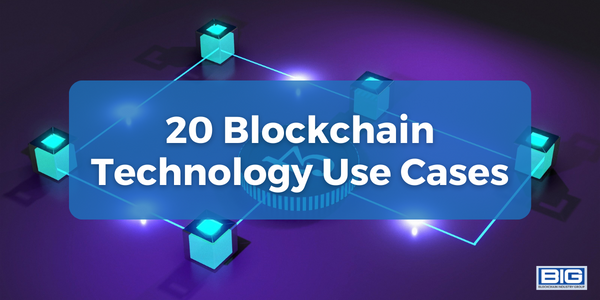
Blockchain technology has the potential to transform a wide range of industries and improve our lives in countless ways. From financial transactions to supply chain management and identity verification to voting systems, blockchain has the potential to increase efficiency, reduce costs, and improve transparency. It could also be used to manage and track the ownership of real estate, securely store and share medical records, verify educational credentials, and track the movement of funds in the charity sector. In addition, blockchain has the potential to facilitate the trade of renewable energy credits, automate the claims process in the insurance industry, improve the efficiency and transparency of government processes, track the ownership and licensing of musical works and art, and optimize the routing and scheduling of transportation. The possibilities for blockchain are truly endless and its potential to improve our lives and the world around us is exciting to consider.
- Financial transactions: Blockchain technology could be used to facilitate the secure and efficient transfer of financial assets, reducing the need for intermediaries and lowering costs.
- Supply chain management: Blockchain technology could be used to track the movement of goods through the supply chain, improving transparency and reducing the risk of fraud.
- Identity verification: Blockchain technology could be used to create secure and verifiable digital identities, improving security and reducing the risk of identity theft.
- Voting systems: Blockchain technology could be used to create secure and transparent voting systems, improving the integrity of elections.
- Real estate: Blockchain technology could be used to manage and track the ownership of real estate, improving the efficiency and accuracy of property transactions.
- Healthcare: Blockchain technology could be used to securely store and share medical records, improving the efficiency and accuracy of healthcare.
- Education: Blockchain technology could be used to verify educational credentials and achievements, improving the efficiency and accuracy of the education system.
- Charity: Blockchain technology could be used to track the movement of funds and ensure that they are used for their intended purposes, improving the transparency and effectiveness of charitable organizations.
- Energy: Blockchain technology could be used to facilitate the trade of renewable energy credits, improving the efficiency and sustainability of the energy market.
- Insurance: Blockchain technology could be used to automate the claims process and reduce the risk of fraud, improving the efficiency and accuracy of the insurance industry.
- Government: Blockchain technology could be used to improve the efficiency and transparency of government processes, such as the issuance of licenses and permits.
- Music: Blockchain technology could be used to track the ownership and licensing of musical works, improving the efficiency and accuracy of the music industry.
- Art: Blockchain technology could be used to track the ownership and provenance of artworks, improving the accuracy and security of the art market.
- Intellectual property: Blockchain technology could be used to track the ownership and licensing of intellectual property, improving the efficiency and accuracy of the IP system.
- Energy trading: Blockchain technology could be used to facilitate the trade of energy, improving the efficiency and transparency of the energy market.
- Food safety: Blockchain technology could be used to track the movement of food through the supply chain, improving food safety and reducing the risk of contamination.
- Transportation: Blockchain technology could be used to optimize the routing and scheduling of transportation, improving the efficiency and sustainability of the transportation industry.
- Retail: Blockchain technology could be used to optimize the supply chain and improve the efficiency of the retail industry.
- Agriculture: Blockchain technology could be used to track the movement of agricultural products through the supply chain, improving the transparency and sustainability of the agriculture industry.
- Environmental management: Blockchain technology could be used to track and verify the environmental impacts of various activities, improving the sustainability and efficiency of resource use.
Gamification Monetization: Play-to-Earn (P2E)
—
Harnessing Innovation: 5 Benefits of Block Chain Technology
—
High-Level: Creating a Non-Fungible Token Project
—
Explore More Blockchain Blogs



